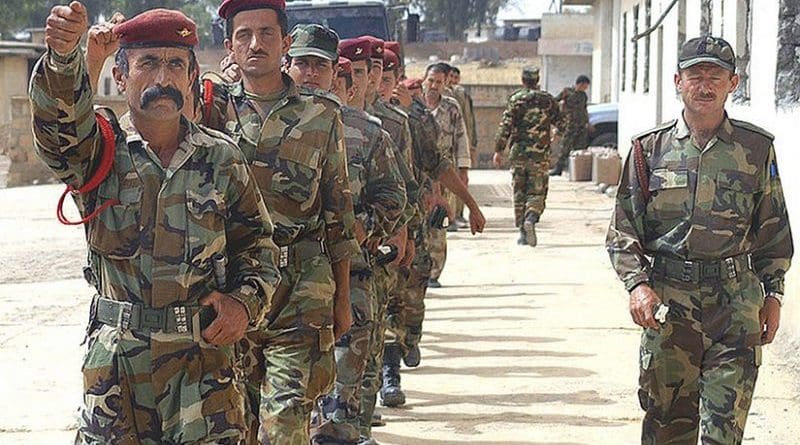Getting Peshmerga Reform Right: Helping Iraqi Kurds To Help Themselves In Post-ISIS Iraq – Analysis
By Published by the Foreign Policy Research Institute
By Samuel Helfont*
(FPRI) — Qubad Talabani is the scion of one of the two most important families in the Kurdistan Region of Iraq (KRI) and is the Deputy Prime Minister of the Kurdish Regional Government (KRG), a semi-autonomous region in northeastern Iraq. He was raised on politics and diplomacy, spending numerous years abroad and even marrying an American. During their engagement, he went hiking in upstate New York with his future in-laws. A bit amused by the situation, he asked his fiancée’s father if they hiked in the mountains for enjoyment. His future father-in-law responded, yes, and asked if Qubad was having fun. “Yeah” Qubad answered, “but the last time I did this there were people with guns chasing me and I had just burned my own house down.”[1]
Casual observers of Kurdish history may respond to such an anecdote with a sigh, lamenting the Kurds’ fate over the past century at the hands of Iraqis, Iranians, Turks, and Syrians. But Qubad was not running from Saddam Hussein or the Turks; he was fleeing other Iraqi Kurds. And this incident was not ancient history. It occurred in the mid-1990s when the Iraqi Kurds, having freed themselves from their Arab rulers, fought a civil war against each other. Despite the glorification of the Kurds in Western media, the economic situation in the KRI is dire, and the political tension between Kurdish factions in Northern Iraq is often fraught. Recently, some perceptive analysts of Iraqi Kurds have warned that the conditions today in Northern Iraq are quite similar to those that led to intra-Kurd fighting in the past, including the Kurdish Civil War of the 1990s.[2]
As the United States develops policies for a post-ISIS Iraq, maintaining peace between Kurdish factions will continue to be a key strategic interest. The United States would benefit greatly from a long-term alliance with a strong Kurdish entity in what is today Northern Iraq. Such an alliance is also in line with American values, as the KRG has tended to be one of the more liberal, secular, and pro-American governments in the region. But the Iraqi Kurds need American help. One of the key areas in which the United States can play a role is assisting in the reform of the Kurdish armed forces, known as the Peshmerga (literally: those who face death). Political parties—not the Kurdish government—control the majority of Peshmerga forces, which will have to change in order to achieve long-term stability in the KRI. The current reform plan, which the United States is already helping to implement, will build the size and capacity of forces under the KRG’s control, but these reforms are moving slowly and many Kurdish stakeholders with whom I spoke on a recent trip to Northern Iraq doubted their long-term viability.
This plan to build up Peshmerga forces under the KRG’s control faces political and technical challenges because Kurdish politics in Iraq are currently deadlocked. The KRI is a self-governing, semi-autonomous zone formed after the Gulf War of 1991. It consists of four provinces: Duhok, Erbil, Sulaymaniyah, and Halabja. Its government also claims the oil-rich Kirkuk province, parts of Ninewa, Salahddin, and Nineveh provinces (especially the Yezidi areas around the Sinjar Mountains). When ISIS assaults exposed the weaknesses of the Iraqi Security Forces (ISF) in 2014, the Peshmerga moved into these disputed areas. The KRG has plans to integrate these territories fully and will not give them up without a fight. The KRI, as well as adjacent disputed territories, is divided into two zones. A “yellow” zone covers the northwestern part and is controlled politically and militarily by the Kurdish Democratic Party (KDP). It consists of the provinces of Erbil and Duhok, as well as parts of Nineveh, such as Sinjar. The “green” zone covers the southeastern area and is controlled by the Patriotic Union of Kurdistan (PUK). It includes the provinces of Sulaymaniyah, Halabja, and Kirkuk.
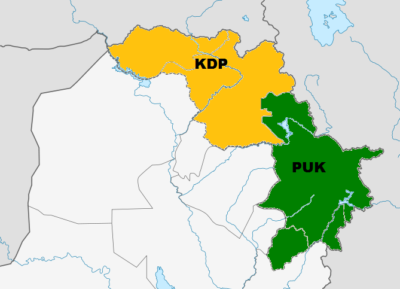
In the 2013 Kurdish elections, a reformist party, Gorran (literally: change), challenged this system by winning 24 of 111 seats and becoming the second largest party in the KRG Parliament. Gorran had formed in 2009 with the hope of offering a more liberal alternative to the KDP and PUK. This addition upset the balance of Kurdish politics in Iraq and angered both the KDP and PUK. In 2014, tensions between the KDP and Gorran reached the point where the KDP ordered its Peshmerga to stop Gorran ministers, including the speaker of the KRG Parliament, Yousif Muhammed, from entering the capital city, Erbil, in the KDP-controlled yellow zone. As such, the government is currently not functioning in accordance with its own laws. Several Kurdish politicians doubted whether this partisan political climate in the KRI would allow a Peshmerga reform plan to move forward.
With regard to technical issues, the existing reform plan is based on building non-partisan combat brigades under the authority of the KRG. However, the United States recognizes the Government of Iraq (GOI) as the sovereign entity responsible for the KRI. Therefore, Baghdad must approve all American military aid to the Iraqi Kurds. This system is not only a legal technicality, but a strategic and political imperative. The United States government, under multiple administrations, has recognized that for the KRI to achieve peace and stability (either as part of Iraq or as an independent entity), its status will need to be negotiated with Baghdad (and to some extent with regional neighbors). Unfortunately, the GOI has an interest in preventing a strong Kurdish military (which it does not control), and Baghdad will likely try to block American efforts to create Kurdish combat brigades. Therefore, any American aid for the Peshmerga post-ISIS will probably come in the form of larger aid packages to the GOI-controlled ISF. For the Kurds to benefit from such a package, the United States will have to mediate forcefully between the KRG and GOI.
However, this report does not focus on aid to the ISF (which is also desperately needed, but is a much larger issue) and instead focuses specifically on Peshmerga reform. It argues that a way around the political and technical obstacles is to offer urgently needed non-lethal aid to the Peshmerga. The Peshmerga forces desperately need a medical corps and communication units. Developing these non-lethal capabilities under control of the KRG would be less politically contentious, and if done properly, they could help to bind all Peshmerga forces to the government and help to change the political culture that prevents the different sides from working together. This non-lethal aid does not have to replace the current reform plan. Ideally, non-lethal aid would be a valuable addition to the current plan. However, many Kurdish leaders expect the current plan to stall. If that happens, the non-lethal aid that this report recommends could be the only thing advancing the reforms.
The Peshmerga: A Primer
Historically, Peshmerga forces have been controlled by political factions rather than the government. The PUK and the KDP each have their own Peshmerga: Division 70 and Division 80, respectively. Accordingly, each of these political parties exert, or attempt to exert, a monopoly on the use of force within their zones. Other Peshmerga forces or Kurdish militias exist as well. The Kurdistan Workers’ Party (PKK) is comprised of Turkish Kurds who adhere to a more radical political philosophy with roots in Maoism. The United States lists the PKK as a terrorist organization, and its harsh methods have put it at odds with the main Iraqi Kurdish parties. Although the PKK’s primary focus is Turkey, it operates in Iraq, most prominently in the regions along the Turkish border and in Sinjar. In Sinjar, members of the Yezidi religious sect also formed their own forces, the Yezidikhan Protection Force (HPE), following the ISIS atrocities against their people. Many other minority areas around Ninewa also now have local protection forces affiliated with religious or ethnic groups—Christian, Shabak, etc.—and many times they are funded by and loyal to either Erbil or Baghdad. Islamist parties, especially around Halabja, also have formed armed groups, and the mountainous areas along the border with Iran and Turkey have sometimes provided refuge for extremists.
These military forces do not coordinate their actions. Even the PUK and KDP forces, which are officially part of the Kurdish and Iraqi militaries and sometimes fight alongside each other, do not work together. One Brigadier General in the PUK’s Division 70 told me that in the fight against ISIS, his forces only take orders from members of the PUK, even if the local commander in the area of operations is from the KDP. This situation creates obvious challenges and inefficiencies in military operations. It also creates problems regarding resource allocation. Neither the PUK’s Division 70 nor the KDP’s Division 80 shares its exact composition with outsiders. Thus, the government and other political parties do not fully understand what forces the KRG has at its disposal. Moreover, they cannot determine if gaps exists between the capabilities of the Peshmerga and the requirements that might arise in a future conflict.
In addition to these security concerns, military forces that are controlled by political parties rather than the government create significant problems for civil-military relations and politics in general. If the Peshmerga were under the control of the KRG, rather than political parties, it is less likely that one party could prevent ministers from rival parties from attending parliament (as the KDP did to members of Gorran). As such, Peshmerga reform is not only essential for the security of the KRI, but it is also a vital element of the region’s political reform.
Peshmerga Reforms
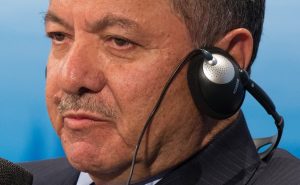
During my recent visit to the KRI, I spoke with a wide range of senior military leaders and policymakers from across the political spectrum. Every one of them recognized the need for reforming the Peshmerga. The KRG has created a Ministry of Peshmerga to control Peshmerga forces that are loyal to the government rather than to political parties. Following the ISIS crisis in the summer of 2014, efforts to empower the ministry and create a united Peshmerga gained momentum among Kurdish leaders, including President Masud Barzani of the KDP, who discussed reform as a strategic imperative.[3]
Some reforms have begun already: the Ministry of Peshmerga created 12 infantry brigades with mixed PUK and KDP forces. The United States has created and fully funded two more, bringing the total number of infantry brigades under the ministry’s control to 14 brigades, totaling 43,000 people. The United States has plans to fund two more infantry brigades along with two artillery support battalions.[4] European states are also helping to train and equip the Peshmerga forces.[5] These developments are a promising start, but the PUK-controlled Division 70 and KDP-controlled Division 80 have at least 20 brigades each.[6] That makes the ministry’s capacity significant, but clearly less so than the political parties.
The KRG has also developed long-term plans to further empower the Ministry of Peshmerga at the expense of the political parties. Eventually, the government would like to create enough brigades in the ministry to make it the dominant force in the KRI. The ministry would also like to standardize its weapons systems. Right now, Kurdish fighters use a mix of weapons, mostly from non-Western sources. The KRG would like to shift toward NATO weapons system, so that they can work more closely with what they see as their natural allies in North America and Europe. The Ministry of Peshmerga hopes to arm its brigades with these NATO weapons while transferring their current stockpile of non-Western arms to the party-controlled Divisions 70 and 80. As this change occurs, Kurdish officials hope that these government-controlled forces will incorporate some elements of Divisions 70 and 80, leaving smaller and less capable Peshmerga forces under control of the political parties. Under this plan, Divisions 70 and 80 would eventually become a reserve force or National Guard, rather than the main security forces in the KRI.[7] While not officially part of the approved Peshmerga reforms, some political leaders have called for conscription, which in the words of the Senior Assistant to President Barzani, Hemin Hawrami, would provide the Ministry of Peshmerga with non-political soldiers to fill its ranks.
The Peshmerga forces also benefit from other more general reforms that have become a priority throughout the KRG.[8] These reforms are meant to streamline the bureaucracy and tackle corruption. For example, a common phenomenon in the KRI is something called “ghost employees.” They are employees on paper who either do not really exist or do not show up for work. Then, people involved in the scheme split the salary of the employee. To fight this scam, the KRG is implementing a biometric system to ensure that everyone who receives a pay check actually works in the job that he or she is supposed to fill. This biometric system will be extended to the Peshmerga to fight the related phenomenon of “ghost soldiers.” This reform will eliminate waste in the Peshmerga budget and also help government officials to understand how many Peshmerga fighters exist (something they currently do not know).
Problems Implementing Reforms
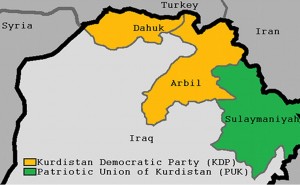
While all of these reforms sound great on paper, implementing them has proven to be a much more difficult task. And in some ways, it may become even more challenging in the near future. In August 2014, President Barzani “granted the Peshmerga minister [Mustafa Saed Qadir] six months to carry out the necessary reforms and place the force under a single, unified command.”[9] Now, two and an half years later, the minister still has not implemented the reforms, and there still is no “single, unified command.” In many ways, Qadir was the perfect candidate to carry out these reforms because he had been a senior Peshmerga commander who joined the reformist Gorran Party. Gorran does not have its own Peshmerga, so he was a neutral third party who could negotiate between the KDP and PUK forces. However, when I visited the Ministry of Peshmerga in Erbil, I was unable to meet with Mustafa Saed Qadir, who technically still serves as the minister. Instead, I had to meet him in his living room in Sulaymaniyah because the KDP Peshmerga will not allow him to enter the capital city of Erbil.
As Qadir explained, the original idea for reforming the Peshmerga under his ministry was to create a truly national force devoid of political affiliations and loyalties. The KDP and PUK pushed back on this plan, causing the KRG to water down the plan. Instead of non-political brigades, the ministry created “mixed” brigades that have a PUK commander, and a KDP deputy commander, or vice versa. So while these brigades are not controlled by the parties, the parties do control who represents them in the new units. The minister claims that none of the long-term reforms—the transition to NATO systems and pushing Divisions 70 and 80 into secondary or reserve status—has yet to start.[10]
With the minister out of the picture, PUK and KDP committees have taken over the responsibility for implementing the reforms. Senior party officials, especially from the KDP, have a more positive attitude toward the current status and future of reforms.[11] Though even the most optimistic among them admit the slow pace of reform implementation, they insist that this type of reform can only be carried out very gradually. While slow implementation can be essential when executing difficult reforms and is an understandable sentiment, at times, it is difficult to distinguish between such gradualism and obfuscation. Right now, the political parties (especially the KDP) have the power to control who receives aid. Although a lack of transparency makes the situation murky, there is popular perception that the KDP uses its position as the largest party in government and its control of Erbil’s security to ensure its forces maintain the majority of the weapons and supplies. Some party officials are clearly happy with this status quo even if they deny it publically.
Another hurdle that Peshmerga reforms have faced, and will continue to face in the future, stems from the Kurds’ relationship to Baghdad. The KRG, while autonomous in almost every way, is still officially a part of Iraq, and the Peshmerga is officially part of the ISF structure. This relationship has caused serious problems for both sides. The resulting tensions were on full display at the recent Sulaimani Forum, which is an annual high-level gathering of stakeholders and academic experts at the American University of Iraq, Sulaimani (AUIS). At the Forum, a spokesman for the Ministry of Peshmerga, Jabar Yawar, defined the Peshmerga’s relationship with Baghdad as one of responsibilities with no rights. In other words, the Kurds are asked to fight in Iraq’s wars (currently against ISIS) and defend Iraq’s northern border, but because of disagreements over control of oil rights in the KRG provinces, the federal government does not provide any money or weapons to the Peshmerga. Almost every Kurdish leader I spoke with expressed frustration with that situation. Pouring salt on the wound, Baghdad recently recognized and began paying fighters in the Popular Mobilization Forces (PMF). The PMF consists of an array of mostly Shi‘i militias that were formed or reinvigorated in reaction to the 2014 ISIS attacks. Many of these PMF militias have been completely unaccountable and accused of serious human rights violations, including “summary killings, enforced disappearances, torture, and the destruction of homes.”[12] The fact that the GOI would pay fighters in the PMF, but not the Peshmerga, has been a serious point of contention.
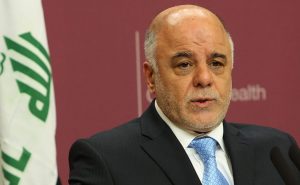
The GOI would prefer to integrate the KRI back into a united Iraq rather than have it break further away. Therefore, Baghdad has no interest in supporting a military force outside of its control like the Peshmerga. The government’s view was clearly expressed by Iraqi Prime Minister Haider al-Abadi when he addressed the Sulaimani Forum. Prime Minister Abadi told the audience at the Forum that Iraq needs a united, national security force, so that the Kurds can feel represented. He forcefully rejected the idea of a divided Iraq, and his speech mentioned Basra (a southern Shi‘i Arab city) and Erbil (a city which the Kurds want as the capital of their future state) in the same breath when discussing the future of Iraq. Later, he told the Forum that Iraqis in Basra, Baghdad, and even in the KRI do not want to be divided. Such statements are out of line with the sentiments among Kurds across the political spectrum in Northern Iraq, but because Baghdad remains the internationally recognized capital of all Iraq (including the KRI), Prime Minister Abadi still maintains significant power over the Kurds.
American Foreign Military Sales (FMS) and Foreign Military Assistance (FMA) programs in Iraq require the approval of Baghdad, even if they are aimed at helping the KRG or the Peshmerga. Prior to the ISIS crisis in 2014, the GOI had prevented most American military assistance to the Kurds. Because Baghdad needed the Peshmerga to help contain and then push back ISIS, the GOI lifted many of its restrictions. That allowed the U.S. to initiate the current plan to help reform the Peshmerga by building brigades under control of the Ministry of Peshmerga. The KRG has welcomed this American aid, and the results thus far have been positive, but once the ISIS crisis subsides, there is no guarantee that Baghdad will not re-impose restrictions on military aid to the Kurds. If one takes seriously the statements of Prime Minister Abadi and other officials in the GOI, the prospects for continuing the current plans are far from assured.[13]
What the United States Should Do
The United States has clear interests in assisting the Iraqi Kurds. Geopolitically, the Kurds are in the heart of one of the most contentious regions of the world. Historic Kurdistan lies at the nexus of Arab, Turkish, and Persian civilizations. The fate of the Kurds is closely tied to the fate of these other peoples and states. A stable KRI would mean better prospects for stabilizing the region, and vice versa. Economically, Iraqi Kurds sit on a sea of oil, which can help to fuel their economy and the economies of neighbors such as Turkey and Syria. And finally, Iraqi Kurds love America and Americans. As a member of the KDP politburo told me, “In other countries, the United States is allied with the leaders of states. In Kurdistan, the relationship is with the people.”[14]
This combination of location, economic potential, and pro-American sentiment make the Iraqi Kurds an ideal ally. While other states in the region serve a more important economic and strategic purpose to the United States, American presence in these states is often quite contentious, and anti-American sentiment generally runs high among their populations. One could easily imagine a situation in which American bases in Turkey or some of the Gulf Arab States become untenable politically. By contrast, American forces would be welcomed enthusiastically in the KRI for the foreseeable future.
Kurdish officials repeatedly expressed their desire for a strong American presence in their territories. A Brigadier General told me rather bluntly that “the U.S. has prevented conflict between PUK and KDP. People welcome U.S. support and recognize that there cannot be any type of happy life in Kurdistan without U.S. presence.”[15] Many stakeholders from across the political spectrum not only welcomed a role for the United States in Iraqi Kurdistan, but hoped that the United States would increase its role there and would apply more pressure on the political parties, pushing them to undertake the reforms that almost everyone accepts as necessary. Even some Kurdish leaders who would lose power and influence if the reforms were implemented said that they welcomed them. Mustafa Chawrash, who is the Commander of all PUK Peshmerga including Division 70, stated that he hoped the U.S. would put more pressure on the political parties to unify the Peshmerga under the KRG.[16] It is rare in history for someone to advocate reforms—no matter how necessary—that cut their power, prestige, and influence. But that is exactly what Chawrash was doing. If the Peshmerga unite under the Ministry of Peshmerga, his position as Commander of PUK forces would be far less significant. When asked about the impediments to implementing these reforms and unifying the Peshmerga, he stated that the Kurds needed money, but just as important, they “need to create a mindset” that allows for reform. The overwhelming majority of Peshmerga fighters have political loyalties, and no one can simply wish them away.[17]
Any Peshmerga reform plan will have to work to alleviate these partisan mindsets as well as act within the political restrictions imposed by various stakeholders in the KRI and in Baghdad. The reform plans that the United States supports accomplish these goals to some extent. Building mixed brigades under the Ministry of Peshmerga, which is the focus of the current plan, not only builds capacity, but also forces Iraqi Kurds from different parties to work together. However, the United States has built only two brigades so far. The ministry has 12 other mixed brigades under its command, and a recent law establishing exchanges between officers from different units also contributes to increasing exposure of Iraqi Kurdish soldiers to other peers from other political parties. However, the vast majority of Peshmerga fighters remain in non-ministry controlled units and have little-to-no contact with fighters from other political parties. Moreover, the current American program of building mixed brigades is only feasible because Baghdad lifted (probably temporarily) restrictions on the United States providing military aid to Iraqi Kurds. Despite these limitations, the American plan to support security sector reform in the KRI is doing a lot of good, and should be continued for as long as possible.
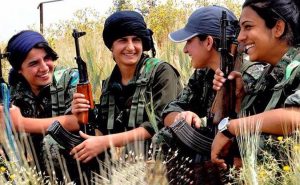
However, the United States can and should supplement its current efforts in a way that hedges against shifting political contexts in post-ISIS Iraq, more thoroughly integrates the various partisan units of the Peshmerga, and helps to create a different mindset among Iraqi Kurdish soldiers. To accomplish this goal in a smart manner, the United States should build desperately needed non-combat capabilities for the Peshmerga, such as a medical corps and communication units. As Brigadier General Hazhar Ismail at the Ministry of Peshmerga explained, the Peshmerga forces have taken over 10,000 casualties since 2014 in the fight against ISIS. Many battlefield injuries were much worse than they needed to be. One of the reasons for this is that the Peshmerga units have no frontline field hospitals. Even worse, they only have 25 ambulances for over 150,000 fighters. By contrast, the ISF has over 1,250 ambulances. Many Peshmerga fighters who receive serious wounds are expected to walk back to safety. Some do not make it. A similarly unacceptable, though less dire, situation exists with regard to battlefield communications. Peshmerga commanders are presently using civilian cellphones to communicate with each other.[18] In addition to problems with reliability under harsh combat conditions, these phones would be a ripe and potentially devastating target for an adversary with even a rudimentary signals intelligence capability.
The U.S. should help the Kurds to build capacity in these areas. A medical corps and communication units could be established within the Ministry of Peshmerga, but made available to the PUK’s Division 70 and the KDP’s Division 80. Doing so would not only save lives and aid the combat efficiency of Divisions 70 and 80, but it also would tie them more closely to the ministry and thus to the KRG. As a parallel, one might consider the case of the U.S. Marine Corps, which does not have its own medics, doctors, or hospitals. Instead, Marines rely on Navy sailors to be their corpsmen, doctors, nurses, etc. It would be unthinkable for the Marines to go into combat without their Navy counterparts. One could imagine a similar situation arising in the relationship between the Ministry of Peshmerga and Divisions 70 and 80. Because of the control that the KDP exerts over the KRG and thus the distribution of military aid, any American program would have to include airtight stipulations that these new units would be non-partisan. Political pressure, especially on the KDP, would need to back up such stipulations. If done correctly, these new units could help to change the partisan mindset of these divisions. For someone who has just been severely injured, the political affiliation of the medic saving his life probably will not be a factor.
Providing assistance in the form of medical services and communication equipment is also less politically problematic. Baghdad and/or the KDP may indeed balk at American efforts to build non-partisan Kurdish combat brigades which are not under their control. It would be much easier for the United States to ask to supply non-lethal aid such as ambulances and field hospitals.
Again, this type of aid should not be seen as a replacement for the current program. Rather, it should be seen as a supplement that enhances the Peshmerga’s combat effectiveness, helps to elevate partisan divisions, and hedges against a shifting political climate in Iraq that may make the current plan unfeasible.
The United States has vital interests in ensuring that the Kurdish Region of Iraq remains at peace with itself, with the Iraqi government, and with the Middle East as a whole. Accomplishing those goals will require reforms that strengthen the Kurdish Regional Government’s ability to replace the political parties as the primary source of legitimate force. Over the past few years, the United States has provided military aid that is helping to achieve that reform. However, the ISIS crisis has temporarily opened a political window that allows for such aid. The United States needs to develop alternative plans to continue these vital reforms once the crisis with ISIS, as well as the political possibilities that accompanied that crisis, subside. This report suggests that non-lethal aid to the Peshmerga may be a more viable means of achieving U.S. objectives in post-ISIS Iraq.
About the author:
*Samuel Helfont is a Robert A. Fox Fellow in the Foreign Policy Research Institute’s Program on the Middle East, and holds a post-doctoral lectureship in the University of Pennsylvania’s interdisciplinary International Relations Program.
Author Acknowledgments: I would like to thank Tally Helfont, Christine van den Toorn, Sarah Mathieu Comtois, Thomas J. Shattuck, Payton Windell, and Alan Luxenberg for making this report, as well as the travel and research it took to compose it, possible. I would also like to thank Tomoharu Nishino for accompanying me on the journey through Northern Iraq, as well as Daban Najmadeen Muhamad for introducing me to various Kurdish officials and for his unique insight into Kurdish politics. Finally, I would like to thank FPRI Trustee Robert A. Fox, whose support for FPRI’s Program on the Middle East, made the trip to Iraqi Kurdistan possible.
Source:
This article is joint report by the Foreign Policy Research Institute* (Philadelphia) and the Institute of Regional and International Studies at American University of Iraq, Sulaimani**
This article was published at FPRI. The Foreign Policy Research Institute is dedicated to bringing the insights of scholarship to bear on the foreign policy and national security challenges facing the United States. It seeks to educate the public, teach teachers, train students, and offer ideas to advance U.S. national interests based on a nonpartisan, geopolitical perspective that illuminates contemporary international affairs through the lens of history, geography, and culture. For more information, visit www.fpri.org.
** The Institute of Regional and International Studies (IRIS) is an independent policy and research center based in the Kurdistan Region of Iraq (KRI). Through multidisciplinary research, strategic partnerships, a fellowship program, and open dialogue events among experts and influential public leaders, IRIS examines the most complex issues facing the KRI, Iraq and the Middle East. IRIS is housed at the American University of Iraq, Sulaimani (AUIS), Iraq’s first independent, not-for-profit, American-style institution of higher learning. IRIS’s location offers academics, analysts, practitioners, journalists and institutions access to areas of interest and a safe space in an otherwise unstable region, making it an attractive, unique meeting place. The Institute’s main focus areas include but are not limited to: governance; energy and the economy; IDP, refugee and minority issues; and post-ISIS Iraq. For more information, visit www.auis.edu.krd/iris/iris.
Notes:
[1] Quil Lawrence, Invisible Nation: How the Kurds’ Quest for Statehood Is Shaping Iraq and the Middle East (New York: Walker & Company, 2008), 64.
[2] Denise Natali, “Is Iraqi Kurdistan heading toward civil war?” Al-Monitor, January 3, 2017, http://www.al-monitor.com/pulse/originals/2017/01/kurdistan-civil-war-iraq-krg-sulaimaniya-pkk-mosul-kurds.html.
[3] Nawzad Mahmoud, “Sources: Barzani Orders Peshmerga Forces Reformed, United,” Rudaw, August 8, 2014, http://www.rudaw.net/english/kurdistan/250820142; Ala Jaff, “Next Step for Peshmerga: Reform,” Rudaw, August 16, 2014, http://www.rudaw.net/english/opinion/16082014.
[4] The most recent sales were approved in April 2017. See, http://www.defense-aerospace.com/articles-view/release/3/183007/us-approves-%24295m-weapons-package-to-equip-peshmerga-fighters.html.
[5] These numbers were obtained through interviews with the Minister of Peshmerga, Mustafa Saed Qadir, March 7, 2017, and with Brigadier General Hazhar O. Ismail, who is Director of Coordination and Relations at the Ministry of Peshmerga, March 6, 2017.
[6] Interview with Mustafa Chawrash, who is the Commander of all PUK Peshmerga, March 8, 2017.
[7] Interview with Brigadier General Hazhar O. Ismail, who is Director of Coordination and Relations at the Ministry of Peshmerga, March 6, 2017.
[8] These reforms were a prominent topic of discussion at the recent Sulaimani Forum, held by the Institute for Regional and International Affairs at the American University of Iraq, Sulaimani, March 8-9, 2017.
[9] Nawzad Mahmoud, “Sources: Barzani Orders Peshmerga Forces Reformed, United,” Rudaw, August 8, 2014 http://www.rudaw.net/english/kurdistan/250820142.
[10] Interview with the Minister of Peshmerga, Mustafa Saed Qadir, March 7, 2017.
[11] Interview with Ali Hussein, who is a member of the 51 person KDP Politburo and in charge of the party’s relation with other Iraqi political parties, March 6, 2017; and Interview with Janghis Awakalay, who works in KDP’s Foreign Relations Office, March 6, 2017.
[12] “Iraq: Ban Abusive Militias from Mosul Operation,” Human Rights Watch, July 31, 2016. https://www.hrw.org/news/2016/07/31/iraq-ban-abusive-militias-mosul-operation.
[13] One could argue that Kurdish independence from Iraq could elevate this problem. However, independence would create its own challenges, which are beyond the scope of this report.
[14] Interview with Ali Hussein, who is a member of the 51 person KDP Politburo and in charge of the party’s relations with other Iraqi political parties, March 6, 2017.
[15] Interview with Brigadier General Najmadeen Muhamad, March 10, 2017.
[16] Interview with Mustafa Chawrash, who is the Commander of all PUK Peshmerga, March 8, 2017.
[17] Interview with Mustafa Chawrash, who is the Commander of all PUK Peshmerga, March 8, 2017.
[18] Interview with Brigadier General Hazhar O. Ismail, who is Director of Coordination and Relations at the Ministry of Peshmerga, March 6, 2017.

